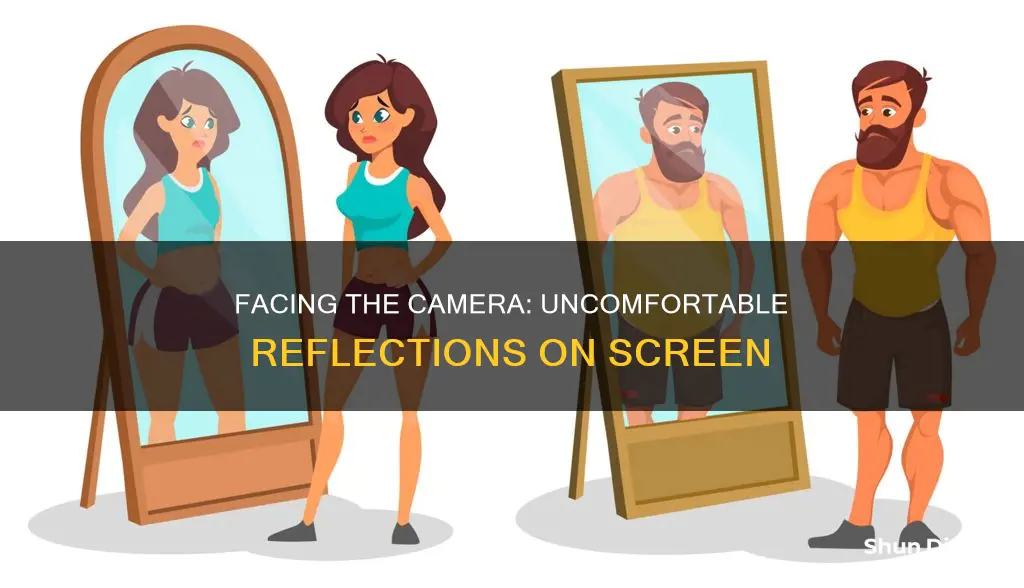
Many people experience discomfort when seeing themselves on camera. This phenomenon is known as camera shyness or camera phobia and can be attributed to various psychological factors. One reason is cognitive dissonance, which occurs when our perception of ourselves differs from what we see on camera, leading to mental stress. We are used to seeing our reflection in mirrors, which is reversed, so when we see our true image, it can seem unfamiliar and unflattering. This is exacerbated by confirmation bias, where we seek out information that confirms our negative beliefs about ourselves. Additionally, we are more critical of our gestures, postures, and voices when recorded, leading to self-consciousness and awkwardness. Overcoming camera shyness involves reframing our perspective, embracing vulnerability, and practicing self-compassion.
| Characteristics | Values |
|---|---|
| Cognitive dissonance | The perception of contradictory information and its impact on our psyche |
| Confirmation bias | The tendency to search for information that confirms our beliefs |
| Self-criticism | Focusing on the negatives |
| Mere exposure effect | Developing preferences for things we become familiar with over time |
| Proprioception | A general sense of the relative position of our body |
| Scopophobia | Excessive fear of being watched |
What You'll Learn
- We are more critical of ourselves than others are of us
- Our brains are wired to kick into fight-or-flight mode when we feel watched
- We are used to seeing our reflection, not our true image
- We are uncomfortable with the cognitive dissonance of seeing our movements instead of feeling them
- We experience our bodies internally, but view them externally on camera

We are more critical of ourselves than others are of us
Many people are uncomfortable with seeing themselves on camera. This discomfort can be attributed to a psychological condition called cognitive dissonance, which refers to the perception of contradictory information and its impact on our psyche. We often have an image of ourselves in our minds, and when we see ourselves on camera, it rarely matches our imagination, causing our brains to "freak out".
We are often more critical of ourselves than others are of us. This self-criticism can be traced back to our childhood, where we internalize the messages and behaviours of those around us. For example, a parent might say, "You'd make more friends if you weren't so quiet," implying that there is something wrong with being quiet. Over time, we start to believe that our worth is conditional on our ability to achieve certain things. This internalized criticism can also come from societal and cultural influences, such as social media, which provides endless opportunities for comparison.
The act of self-criticism can be a person's vehicle to success. Many believe that being hard on themselves will keep them focused and in line with their goals. However, excessive self-criticism is associated with higher levels of stress, anxiety, and depression. It induces guilt and shame, which can paralyse us into inaction. Self-criticism can also affect us physically, increasing blood pressure and cortisol levels, which can lead to weight gain, migraines, and a suppressed immune system.
So, how can we combat this tendency for self-criticism? Firstly, it is important to develop self-awareness and get to know your self-critical voice. Write down your self-critical thoughts and identify the themes and triggers. Then, try to develop self-compassion and treat yourself with kindness and non-judgmental understanding. Finally, stay connected with others and seek support from a therapist or counsellor if needed. By taking these steps, we can begin to shift our focus from negative self-talk to self-acceptance and compassion.
Exploring Night Owl Cameras: A Comprehensive Guide
You may want to see also

Our brains are wired to kick into fight-or-flight mode when we feel watched
Feeling uncomfortable when seeing yourself on camera is a common phenomenon, and it is rooted in psychology and human biology. Our brains are wired to kick into fight-or-flight mode when we feel watched, as our brain interprets the "watcher" as a potential predator. This response is deeply ingrained in our biology, and it can cause a sense of vulnerability and increased self-consciousness.
The feeling of discomfort when being watched or observed is not limited to in-person interactions. The mere presence of a camera can trigger this primal response, even if the person behind the camera is a friendly colleague. This response is so strong that it can cause a person's "mood and self-esteem [to] plummet", as observed by USC professor T. Shelley Duval in an experiment. The act of being photographed or filmed can make people feel overly self-conscious and vulnerable, as they become intensely aware of the gap between their true self and their idealized self.
This discomfort is further exacerbated by the fact that we are used to seeing ourselves in a mirror, which shows a reversed image of our faces. When we see ourselves on camera, we are seeing our true image, which can seem unfamiliar and strange to us. This discrepancy between our expected image and the true image can be jarring and contribute to the feeling of unease.
Additionally, when we see ourselves on camera, we notice our quirks, gestures, and mannerisms that we may not be aware of in our day-to-day lives. We become hyper-aware of our facial expressions, body language, and even the tone of our voice. This heightened self-awareness can lead to feelings of self-criticism and the belief that others are judging us as well.
The good news is that it is possible to overcome this camera shyness or phobia. By recognizing that this discomfort is a natural response and understanding the psychological and biological factors at play, we can start to reframe our thoughts and feelings about being on camera. With practice and a shift in perspective, it is possible to feel more comfortable and confident in front of the lens.
Creepy Boss, Watching Cameras: What to Do?
You may want to see also

We are used to seeing our reflection, not our true image
Many people experience discomfort when seeing themselves on camera. This phenomenon can be attributed to various psychological factors, one of which is the fact that we are used to seeing our reflection rather than our true image.
The human brain is highly adaptable and uses shortcuts, known as heuristics, to process information quickly. One such shortcut is the familiarity principle, which states that we develop preferences for things we are exposed to regularly. In the context of self-perception, we are most familiar with our reflection in the mirror, which becomes our preferred image of ourselves. This is because, over time, our brains become conditioned to favour the mirrored version of ourselves, which is slightly different from our true image.
The preference for our mirror image is supported by the mere-exposure effect, a psychological phenomenon where familiarity breeds attraction. We see our reflection daily, and this consistent exposure leads to a preference for that specific image. Our brains then interpret our true image, as seen by others and captured on camera, as unfamiliar and less attractive. This discrepancy between our expected image (the mirror image) and our true image can cause discomfort and cognitive dissonance.
Additionally, the way light reflects off surfaces, such as mirrors, can also contribute to this phenomenon. When light reflects off a mirror, it follows the law of reflection, where the angle of incidence equals the angle of reflection. This creates a mirror image that appears reversed from left to right compared to our true image. As a result, the mirror image differs from our true image, which can be disconcerting when we encounter it on camera.
Furthermore, the asymmetry of our faces plays a role in this preference for our mirror image. Our faces are not perfectly symmetrical, and when we see our true image, it may appear slightly "off" compared to the familiar mirror image. This subtle difference can be enough to trigger discomfort and a sense of dissonance.
To summarise, the reason we may feel uncomfortable seeing ourselves on camera is because we are more accustomed to our reflected self-image. The familiarity and constant exposure to our mirror image make it our preferred representation of ourselves, and any deviation from this image can lead to feelings of unease and cognitive dissonance. Understanding these psychological factors can help us become more comfortable with our true image and reduce the discomfort associated with seeing ourselves on camera.
Infrared Cameras: 3D Vision Explained
You may want to see also

We are uncomfortable with the cognitive dissonance of seeing our movements instead of feeling them
The discomfort of seeing oneself on camera can be attributed to cognitive dissonance, which occurs when our thoughts, beliefs, and actions are inconsistent or contradictory. This dissonance creates a sense of mental stress and discomfort, prompting us to seek ways to reduce it.
When we see ourselves on camera, we become aware of the discrepancy between our self-image and our actual appearance and behaviour. We are used to perceiving ourselves from a particular perspective, often through reflections or mirrors, which show a reversed image of ourselves. This image differs from how others see us and how we appear on camera. As a result, we may feel uncomfortable or uneasy as we struggle to reconcile these conflicting views.
Cognitive dissonance can also arise from the mismatch between our expectations of ourselves and our observed behaviour. We may have certain beliefs about our gestures, mannerisms, or the way we speak, only to discover that our actual behaviour differs significantly. This dissonance can lead to self-consciousness and a tendency to focus on our perceived flaws or awkwardness.
Additionally, the mere exposure effect comes into play. This phenomenon suggests that we develop a preference for things we become familiar with over time. However, when it comes to our own faces, we are more familiar with our reflected image than our true image. As a result, we may find our true image less attractive or uncomfortable to look at.
Furthermore, confirmation bias can exacerbate our discomfort. We tend to seek out information that confirms our existing beliefs. If we believe we are awkward on camera, we will focus on any evidence that supports this belief, ignoring any positive aspects of our performance. This bias can lead to a negative self-image and further discomfort when seeing ourselves on camera.
To overcome this discomfort, we can try to align our self-image with our observed behaviour. This can be achieved by changing our behaviour, justifying or accepting it, or ignoring the conflict. For example, we can work on improving our body language or communication skills. Alternatively, we can reframe our perspective and view our movements and gestures as a form of expression that enhances our message.
Cameras' Vision: Around Trailers
You may want to see also

We experience our bodies internally, but view them externally on camera
Many people experience discomfort when seeing themselves on camera. This phenomenon can be attributed to various psychological factors, including cognitive dissonance, confirmation bias, and the mere exposure effect.
Cognitive dissonance arises when our perception of ourselves differs from what we see on camera, leading to a sense of discrepancy and mental stress. We experience our bodies and movements internally and intuitively, but when viewed externally on camera, we become hyper-aware of our gestures, postures, and facial expressions, often judging ourselves harshly. This dissonance can cause some to avoid being in front of the camera altogether.
Confirmation bias also plays a role in our discomfort. We tend to seek out information that confirms our pre-existing beliefs or expectations. If we believe we are awkward on camera, we will focus on any slight hint of clumsiness, ignoring all evidence to the contrary. Our brains are wired to protect us, but this bias can lead to a negative self-image and a cycle of self-fulfilling prophecies.
Additionally, the mere exposure effect comes into play. We develop preferences for things we become familiar with over time. We are used to seeing our reflection in mirrors, which is a reversed image of how we appear to others. When we see ourselves on camera, it is often our true image, not the mirrored one we are accustomed to. This unfamiliarity can cause discomfort and a sense of something being "not quite right."
The combination of these factors contributes to the unease many people feel when seeing themselves on camera. Our internal experience of our bodies and movements does not always align with the external view, leading to a sense of dissonance and self-criticism. However, it is important to remember that we are often our own harshest critics, and others do not share the same biases about us.
Capturing Life: Through My Eyes and Camera Lens
You may want to see also
Frequently asked questions
There are several reasons why someone might feel this way. One reason is that we are used to seeing our reflection in the mirror, which is the reverse of how we appear on camera, and this unfamiliarity can make us feel uncomfortable. Additionally, we often have preconceived notions of how we look and sound, and when the image or footage doesn't match our expectations, it can lead to cognitive dissonance, causing us to feel awkward or self-conscious.
Confirmation bias plays a role in this. We tend to seek out information that confirms our previously held beliefs, so if you already believe you are awkward on camera, you are more likely to focus on any slight hint of clumsiness and ignore positive feedback. This can be exacerbated by beauty standards and societal expectations that are constantly evolving and influencing how we think about our appearance.
Being filmed or photographed can trigger a fight-or-flight response, as our brains interpret the "watcher" as a potential predator. This can lead to increased self-consciousness and a negative impact on our mood and self-esteem.
Here are some strategies to improve comfort on camera:
- Remember that your brain may be playing tricks on you due to the reversed image, cognitive dissonance, and confirmation bias.
- Refocus your attention on your message or the task at hand rather than your appearance.
- Make sure you feel comfortable and have everything you need, such as water or a script, to reduce nerves.
- Realize that others are not judging you as harshly as you might judge yourself. They are focused on your content and are likely cheering you on.







